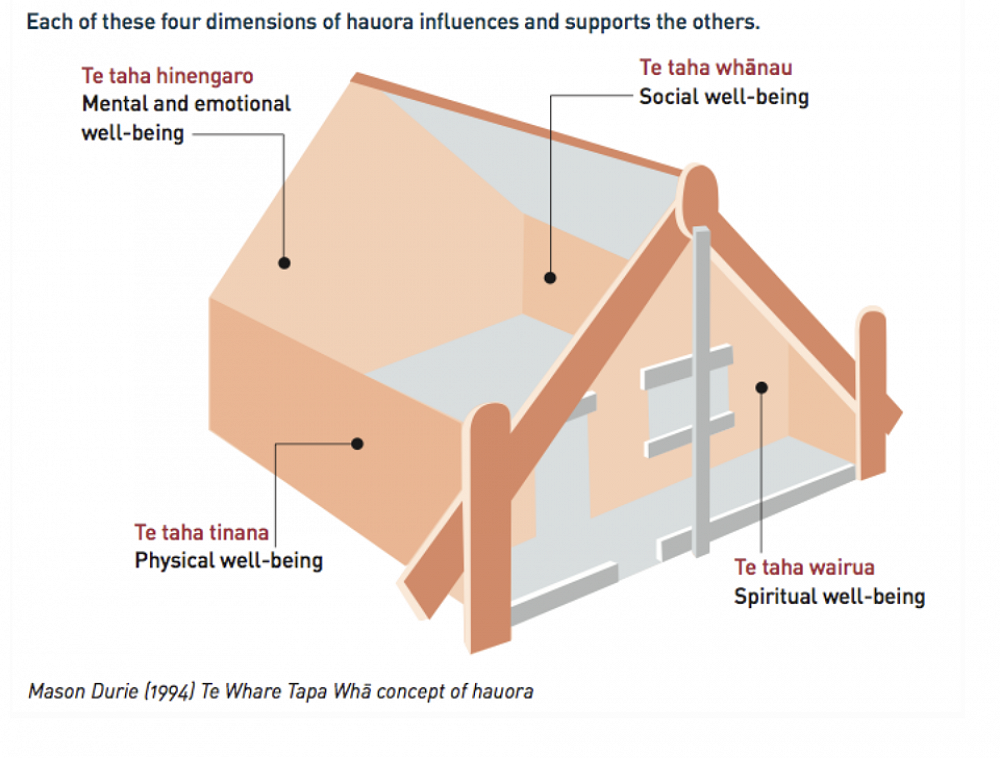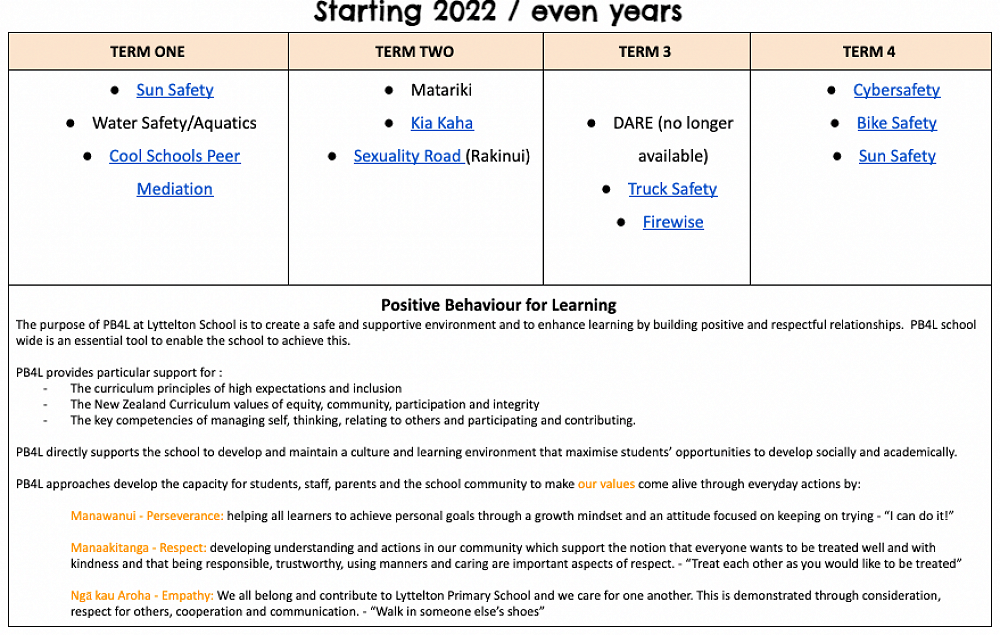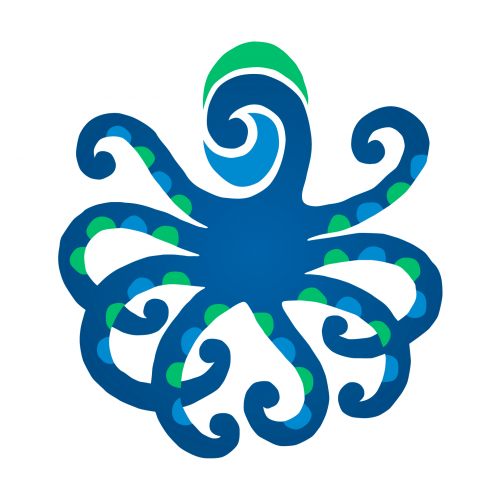
Health Curriculum
Health Curriculum Statement
Purpose
Section 60B of the Education Act 1989, as amended by the Education Standards Act 2001, requires the Board of Trustees to produce a written statement, following consultation with the school’s community, about how the school will implement health education once every two years.
To consult with parents, caregivers and staff about the health learning needs of Lyttelton Primary School students and to provide programmes that will make a difference to their well-being.
Health and Physical Education at Lyttelton Primary School
Our beliefs for health education are underpinned by the mission, vision, values of Te kura tuatahi o Ōhinehou and reflect the importance of Te Wheke and its ability to adapt confidently to an ever changing environment. ‘Thriving today, ready for tomorrow.’
To ensure Lyttelton Primary School provides for health education which improves the learning of knowledge, skills, attitudes and values for a healthy lifestyle, a number of school beliefs about teaching and learning underpin the work of the school. These are discussed and shared in the ‘Our Learning’ menu of the school website.
To support health education Lyttelton Primary School works to ensure:
all members of our school community are valued as teachers and learners
learning programmes offer opportunities for learners to become self-managing learners
we develop experiential learning programmes.
we develop learner centred learning opportunities.
learning is not limited to age and stage
real life contexts are encouraged which strengthens relevance for students
children benefit from a range of learning situations and experiences.
The principles of Kahikita ‘Accelerating Success’ guide the actions which work towards realising the vision of Māori students enjoying and achieving education success as Māori.
Staff consider how and when the resources, support and expertise in the local and wider community could best be used to support teaching and learning and achieve the goals of the school.
Our students have the power, combined with choices, to take meaningful action and see the results of those decisions.
Community Partnerships and Relationships are used to support and enhance well resourced and engaging learning programmes for our children.
Health Programme Implementation
Four underlying and interdependent concepts are at the heart of this learning area:
Hauora– a Māori philosophy of well-being that includes the dimensions taha wairua, taha hinengaro, taha tinana, and taha whānau, each one influencing and supporting the others.
Attitudes and values – a positive, responsible attitude on the part of students to their own well-being; respect, care, and concern for other people and the environment; and a sense of social justice.
The socio-ecological perspective – a way of viewing and understanding the interrelationships that exist between the individual, others, and society.
Health promotion – a process that helps to develop and maintain supportive physical and emotional environments and that involves students in personal and collective action.
“Mason Durie describes four dimensions of hauora in the development of his widely used model of Maori health, Te Whare Tapa Wha.
Te Whare Tapa Wha is represented by the four walls of a wharenui, 3 or meeting house, where each wall symbolises the elements necessary to sustain hauora or health and wellbeing. These dimensions or elements are taha hinengaro, taha wairua, taha tinana, and taha whanau. Taha hinengaro focuses on mental health and emotions. taha wairua focuses on spiritual health. Taha tinana focuses on physical health and taha whanau focuses on the epicentre of one's wellbeing:whānau.”

The learning activities in health and physical education arise from the integration of the four concepts above, the following four strands and their achievement objectives, and seven key areas of learning.
The four strands are:
Personal health and physical development, in which students develop the knowledge, understandings, skills, and attitudes that they need in order to maintain and enhance their personal well-being and physical development
Movement concepts and motor skills, in which students develop motor skills, knowledge and understandings about movement, and positive attitudes towards physical activity
Relationships with other people, in which students develop understandings, skills, and attitudes that enhance their interactions and relationships with others
Healthy communities and environments, in which students contribute to healthy communities and environments by taking responsible and critical action.
The seven key areas of learning are:
mental health
sexuality education
food and nutrition
body care and physical safety
physical activity
sport studies
outdoor education.
Programmes we currently deliver at Lyttelton School as part of our health curriculum:
- Life Education - topics such as food & nutrition, friendships, human body, relationships)
- Kia Kaha (Police Education - Anti-bullying)
- Keeping Ourselves Safe (Personal Safety)
- Sun Safety
- Road Safety, Truck Safety & Bike Safety
- Water Safety & Aquatics
- Nutrition and Healthy Eating
- Wellbeing (Pause, Breathe, Smile, Mindfulness, Zones of Regulation)
- Self Defence
- Sexuality Road (friendships, different kinds of families, respect for each other, pubertal change and body development and body image)
- DARE (Drug Education)
- Cool Schools Peer Mediation
- Cyber Safety
- Variety of sporting opportunities and events
- Education Outside the Classroom eg School Camps, Beach Activities, Trips etc
In addition, we also manage our health curriculum through:
School Policies and Practices such as Sunhats - Term 1 & 4 & Play, Eat, Learn
- Positive Behaviour for Learning (PB4L) & a focus on our school values
- Enviro Schools (Healthy Communities & Environments)
- Restorative Practice
- Social Skills Groups
- Mana Ake support
How we deliver these programmes?
The teaching of our health curriculum is planned over a two year cycle with consideration to school and community needs.These topics are taught in classroom contexts and are often interwoven throughout the day alongside our Positive Behaviour for Learning (PB4L) lessons, focus weeks and in a home-school partnership, e.g., Keeping Ourselves Safe. Positive behaviour for learning (PB4L) supports the delivery of the health and curriculum and all curriculum by creating a safe and supportive environment to enhance learning by building positive and respectful relationships. We tailor what we do to meet the needs of each learning space and to meet the curriculum achievement objectives. Some topics may have either a junior school and/or senior school emphasis.
Te Kura Tuatahi o Ōhinehou Health Long Term Plan
The teaching of the health curriculum is planned over a two year cycle with consideration to school and community needs. Positive behaviour for learning (PB4L) supports the delivery of the health and curriculum and all curriculum by creating a safe and supportive environment to enhance learning by building positive and respectful relationships.


